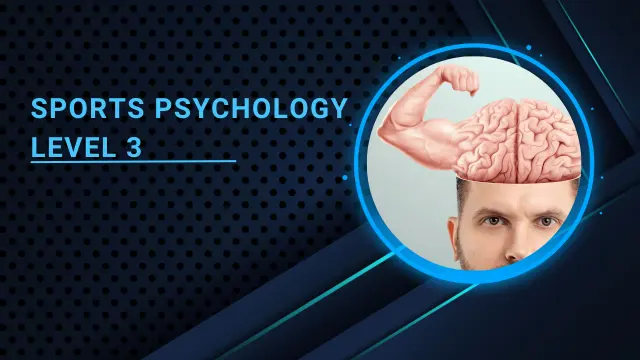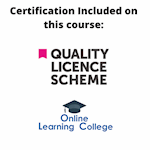
Sports Psychology Level 3
Online Learning College
Summary
- Sports Psychology Level 3 - Free
- TOTUM card available but not included in price What's this?
Add to basket or enquire
Overview
Psychology is what sets great athletes apart from others. Understanding this link is very important and our Sports Psychology Level 3 course is designed to cover what makes sportsmen and women tick in order to gain the competitive edge need to win.
Certificates
Sports Psychology Level 3
Hard copy certificate - Included
Certificate upon completion.
Course media
Description
About this Sports Psychology Level 3 Course
Sports Psychology is about getting into the head of sportspeople to be able to reduce issues and increase performance through psychological development. Understanding the power of the mind in performance is vital for many athletes to gain the edge needed to win in competition. Our Sports Psychology Level 3 course covers several units to enable you to fully understand the need for a strong mindset in sport.
Study Time: 100 hours
Enrolment length: 12 months
Course format: Online
Entry requirements: None Specific
Upon completion of this course students receive a Quality Licence Scheme certificate and an OLC Certificate. All certification fees are included in your course fees.
Certification
To complete this Sports Psychology Level 3 course you will need to submit, and pass, all of the tutor marked assignments. There are seven assignments in the course and no need to purchase any textbooks as we provide all of the lessons and materials required to learn the syllabus.
All assignments are coursework based and are in an essay/question and answer style to test your knowledge of the topics covered in each of the course sections.
Course Content
This course assesses the following units:
Unit 1 – The role of the sports psychologist – It has become increasingly obvious that the way in which an athlete thinks is of great importance to the way in which they perform, and therefore the use of a sports psychologist helps the athlete to be mentally prepared as well as physically prepared. This unit will cover the work of a sports psychologist and the edge they can give to athletes.
Unit 2 – Research methods – You will learn about qualitative and quantitative research methods and discover the different types of experiments that might be carried out such as laboratory, field and natural.
Unit 3 – State of mind – You will explore the different types of anxiety and look at measuring levels. You will learn about factors that induce anxiety and stress such as situational and individual, and examine ways of reducing these conditions.
Unit 4 – Personal attributes and sports psychology – This unit will help you to identify the different social learning theories and encourage you to look at how personality impacts on a person’s attitude towards sport.
Unit 5 – Aggression and sport – In this unit you will explore the different forms of aggression including hostile and instrumental aggression and gain an insight into how aggression affects performance.
Unit 6 – Motivation, mental health and recovery – This unit will teach you the importance of motivation in sports psychology and how each individual’s motivation will differ from others.
Unit 7 – Social influences and group dynamics – In our final unit you will explore the different styles of leadership and examine theories surrounding leadership before making the important connection between the relationship of coach and athlete.
This course can be taken over a 12 month period but you can complete it as fast or as slowly as you wish.
Support
The most important tool that all of our students have at their disposal is their tutor. When studying for a course with us you are assigned a personal tutor with in-depth knowledge and experience in your chosen subject.
You are strongly advised to make use of your tutors expertise and ask questions about the course content. Your assignments are marked by your personal tutor and detailed feedback is given. As well as this your tutor will provide you with pointers and advice on where you can improve- this helps you to get the most from your courses and constantly improve your skills.
Assessments
To pass this course learners must pass 7 assignments. These are completed after navigating through the corresponding lessons and writing your answers to assignment questions. Once these have been read and marked by your personal tutor, feedback and marks are provided to students which contain helpful tips to improve work in future assignments.
Enrolment Length
All of our courses are allocated plenty of time for students to complete their studies and all materials are self-led so that you can complete the course at your own pace. Should you require additional time on one of our courses you can extend your enrolment by 30 days for an additional fee of £60.
As well as this we operate a 14 day money back guarantee on every one of our courses- that’s how confident we are of how you will love studying with us!
Who is this course for?
Anyone wanting to understand sports psychology or a sports person.
Requirements
No entry requirements.
Career path
Sports Psychologist
Questions and answers
Currently there are no Q&As for this course. Be the first to ask a question.
Reviews
Currently there are no reviews for this course. Be the first to leave a review.
Legal information
This course is advertised on reed.co.uk by the Course Provider, whose terms and conditions apply. Purchases are made directly from the Course Provider, and as such, content and materials are supplied by the Course Provider directly. Reed is acting as agent and not reseller in relation to this course. Reed's only responsibility is to facilitate your payment for the course. It is your responsibility to review and agree to the Course Provider's terms and conditions and satisfy yourself as to the suitability of the course you intend to purchase. Reed will not have any responsibility for the content of the course and/or associated materials.



